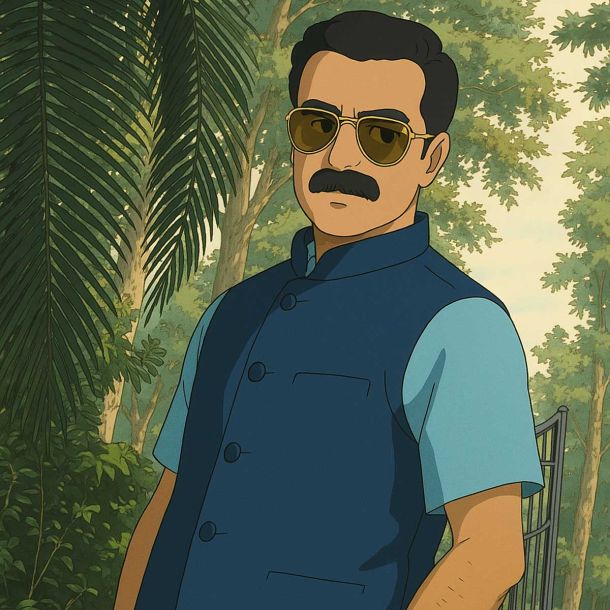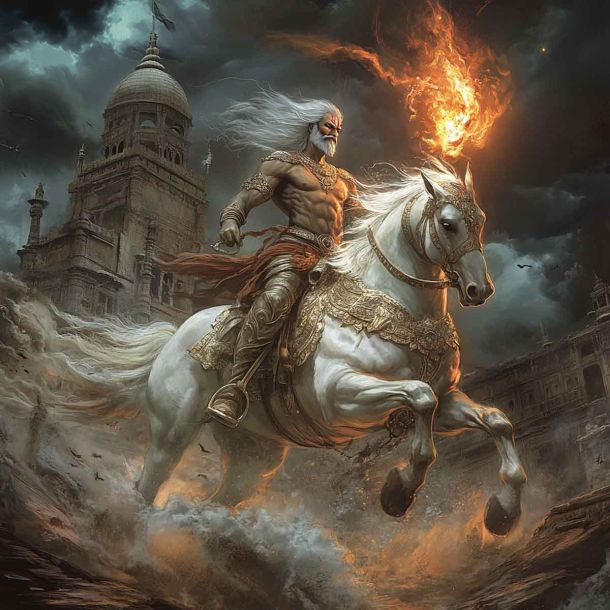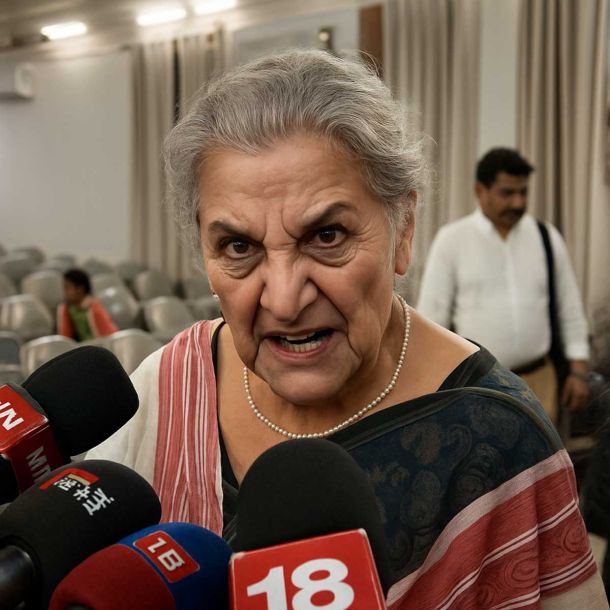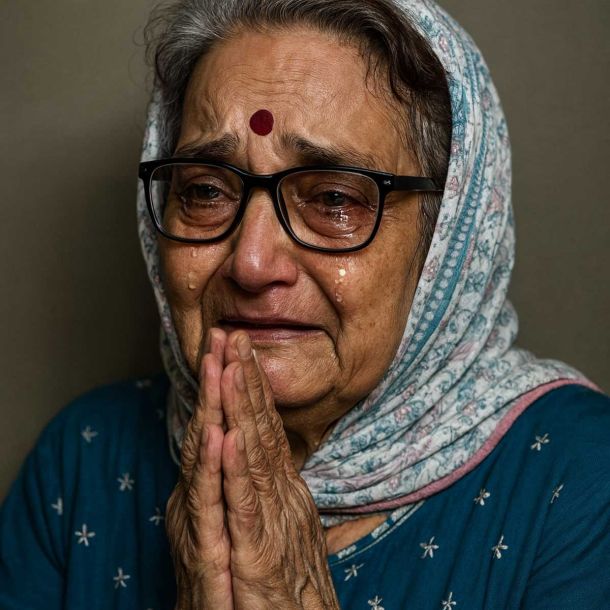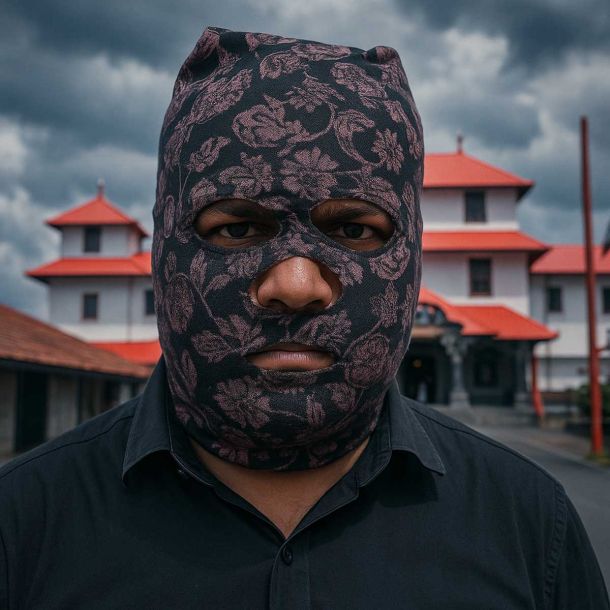More Coverage
Twitter Coverage
Satyaagrah
Written on
Satyaagrah
Written on
Satyaagrah
Written on
Satyaagrah
Written on
Satyaagrah
Written on
Join Satyaagrah Social Media
Why is Vibhishana not considered a traitor - Loyalty Versus Righteousness

Page 1 of 3
The mythology of every land is a mirror to its culture, tradition, ethos and the psyche of its people. The tales and legends contained in great epics are not only educative and entertaining, but also serve as a lesson to educate past, present and future generations on cultivating and maintaining values, morals and, in general, becoming a better person.
The great Indian epics, the Ramayana and the Mahabharata, are veritable beacons in this aspect. Relevant in all times and to all ages, these works delve deeply into human behavior through their characters; thus showing followers the right path towards Dharma or righteousness.
Such is the tale of Vibhishana, the brother of King Ravana. His life is one of the best examples of selflessness, devotion, service and adherence to the Dharma. Let us take a detailed look at the life and times of Vibhishana.
Vibhishana
Vibhishana, also called Bibhishan, was the younger brother of Ravana, the Demon King of Lanka, in the great epic Ramayana. Though an asura himself, Vibhishana displayed none of his clan's characteristic behavior. He was, in fact, a noble character and great devotee of Lord Rama, the seventh avatar of Sri Maha Vishnu and also the central character of the Ramayana. Vibhishana was all for peace and tried to advise Ravana against abducting Rama's wife, Sita. He wanted his brother to return Sita to her husband. When the former refused to heed his words, Vibhishana deserted him and joined Rama's army; eventually helping the latter defeat Ravana.
Some records of Sinhalese history consider Vibhishana as one of the Sathara Waram Deviyo or the four guardian deities. This belief took predominance during the Kotte period. The Ravana Katha of Wickramasinghe Adigar narrates that, after Ravana was defeated and killed by Rama, Vibhishana ascended the throne as King. He then moved his Yaksha capital from Alakamandawa to Kelaniya. Post the 16th century, he was revered as a God of the four warrants by the Goddess Pattini. He still continues to be worshipped by a small number of devotees, mainly in the Kelaniya area.
Early Life
Vibhishana was the youngest son of Sage Vishrava and Kaikesi. The brother of Ravana and Kumbhakarna, he is also one of the Seven Chiranjivis, or the Seven Immortal Beings in Hinduism, who will live on till the end of the present Kali Yuga. Though an asura himself, he defected from Ravana and went on to join Lord Rama to fight against him.
Vibhishana's character is quite similar to that of Yuyutsu in the Mahabharata. Yuyutsu was the son of Dhritarashtra. Born to Dhitarashtra's wife, Gandhari's maid, Sughada, he was the half-brother of the Kauravas. Yet, he chose to fight against them during the Great War of Kurukshetra.
Right from childhood, Vibhishana had a pure mind and sattvic nature. Even though he was a demon by birth, he considered himself to be a Brahmin. He was the grandson of the great sage, Pulatsya, so he was particular to keep up the name and reputation of his illustrious lineage. Hence, he discharged all his karmas as a Brahmin would.
As a little boy, he would spend all his time meditating on the name of the Lord. Pleased with his devotion, Lord Brahma appeared before him and offered him any boon he wanted. Vibhishana said that the only thing he ever wanted was to have his mind unwaveringly fixed on the Lord's Lotus Feet. He only wanted to be a servant of Lord Sri Maha Vishnu. Brahma readily granted him his boon and disappeared from there.
In the Ramayana
Vibhishana played a vital role in the Ramayana. He moved away from his own family, giving up all his wealth and royal status. He then supported and aided Rama throughout his tussle with Ravana. To understand his character to the fullest extent, we go right back, to the time of the Sita Swayamvara.
The Sita Swayamvara
Ravana had wanted Sita, ever since he first laid eyes on her. He was totally smitten by her beauty and charm and wanted to marry her at all costs. When the time came, Sita's father, King Janaka, arranged her swayamvara ceremony. For this, he invited all the Kings and princes from the nearby areas to come and participate in the ceremony.
King Janaka stipulated a condition for the prospective groom during the ceremony. He declared that only the person who would be able to lift and string the massive Shiva Dhanush (Lord Shiva's bow), would be able to win the hand of his daughter in marriage. Many a mighty ruler came forward to pick up the bow, but none could manage to even move it an inch.
Ravana too was one of the participants. Being vain and overconfident, he was absolutely sure that he would be able to lift the bow with ease. He was an ardent of Lord Shiva, but his ego blinded him into disrespecting his own ishta devata (favorite deity).
Casually strolling up to the platform where the bow was placed, Ravana gloated that he would be able to lift it with his little finger. He then proceeded to lift it taking minimum effort. When he saw that it would not move, he went on to put in more and more effort, finally using all his might. After several tries, Ravana did manage to lift it a bit off the ground. However, it proved to be too heavy for him and dropped back to the platform with a loud thud. Frustrated and humiliated, he returned to his seat, secretly vowing that he would make Sita his own, no matter what came in his way.
Rama, the Prince of Ayodhya, was also present in the gathering, along with his younger brother Lakshmana and Sage Vishwamitra. When his turn came, Rama humbly prostrated before the Sage, greeted everyone and then, praying to Lord Shiva, offered his obeisance to the Shiva Dhanush.
Bending down, he lifted the bow in one effortless swoop and strung it, giving the string a sharp twang, the echo of which rang miles away. Everyone present there cheered and applauded this young prince who had accomplished the impossible.
Janaka, who had been dismayed till then, was elated to find a groom most worthy of his daughter. Sita too was delighted that Rama was going to wed her. She had fallen in love with him the moment she saw him and had been praying for this moment. She never liked Ravana and had gotten scared when he had tried to lift the bow.
The marriage ceremony took place in a grand manner and Rama and Sita became man and wife with the blessings of everyone present there. All except Ravana, who stormed out of the venue in a rage.
Ravana Abducts Sita
Soon after the wedding, Kaikeyi, Rama's stepmother, forced her husband Dasharatha to make her own son, Bharata, the King of Ayodhya. She connived with her evil maid Manthara to hatch a plan to force Rama to leave Ayodhya and spend some years in exile in the forest region of Dandaka. In the past, Dasharatha had told Kaikeyi to ask for two boons. At that time, she had said that she would take up on the offer whenever the time came. Now, she took advantage of that and asked her husband for the two boons. Firstly, she said that her son, Bharata, must ascend the throne. Secondly, Rama should go on an exile to the Dandaka forest for a period of 14 years.
Dasharatha was heartbroken that his oldest and favorite son had to leave thus. He, however, had no choice and had to let Rama leave. Rama, on the other hand, was calm and ever-willing to obey his parents' orders. Sita and Lakshmana too willingly renounced the comfort of the palace and joined Rama on his journey to Dandaka.
In the meantime, Ravana was still fuming at the humiliation he had faced at the hands of Rama. He was still thinking of wreaking revenge. Rama, Sita and Lakshmana had moved to the forest at Panchavati and this offered Ravana the chance he had been waiting for, since so long. He decided it was now time to abduct Sita and take her to his palace.
He asked his Uncle, Maricha, to disguise himself as a golden deer and entice Sita. The deer reached Rama's hut and strolled around in the vicinity. Sita was immediately attracted to it and tried to catch it. After failing several times, she finally requested Rama to go bring the deer to her. Rama asked Lakshmana to keep a watch and left to fetch the deer.
 Support Us
Support Us
Satyagraha was born from the heart of our land, with an undying aim to unveil the true essence of Bharat. It seeks to illuminate the hidden tales of our valiant freedom fighters and the rich chronicles that haven't yet sung their complete melody in the mainstream.
While platforms like NDTV and 'The Wire' effortlessly garner funds under the banner of safeguarding democracy, we at Satyagraha walk a different path. Our strength and resonance come from you. In this journey to weave a stronger Bharat, every little contribution amplifies our voice. Let's come together, contribute as you can, and champion the true spirit of our nation.
 |  |  |
| ICICI Bank of Satyaagrah | Razorpay Bank of Satyaagrah | PayPal Bank of Satyaagrah - For International Payments |
If all above doesn't work, then try the LINK below:
Please share the article on other platforms
DISCLAIMER: The author is solely responsible for the views expressed in this article. The author carries the responsibility for citing and/or licensing of images utilized within the text. The website also frequently uses non-commercial images for representational purposes only in line with the article. We are not responsible for the authenticity of such images. If some images have a copyright issue, we request the person/entity to contact us at This email address is being protected from spambots. You need JavaScript enabled to view it. and we will take the necessary actions to resolve the issue.
Related Articles
- Biggest Wonder of the World : Kitchen of Lord Shri Jagannath
- Culture And Heritage - Meenakshi Temple Madurai
- An Artisan Heritage Crafts Village: Indigenous Sustainability of Raghurajpur
- Jagannath Temple administration issues clarification on proposed sale of temple lands
- The forgotten temple village of Bharat: Maluti
- Shri Murudeshwar Temple: Home To The World’s Second Tallest Shiva Statue
- Why India’s temples must be freed from government control
- Srikalahasti Temple, Dakshina Kailash
- Righteousness vs Loyalty: Prince Rama obeys his father and leaves the Ayodhya kingdom
- A Different 9/11: How Vivekananda Won Americans’ Hearts and Minds
- Lakshmi Narasimha Swamy Temple, Antarvedi, Andhra Pradesh
- अथ रामचरितमानस प्रकाशन कथा: गीता प्रेस, गोरखपुर ने 1938 से रामचरितमानस का प्रकाशन शुरू किया
- Hindu Survival: What Is Needed To Be Done?
- रामचरितमानस एवं उसके अंग्रेजी अनुवाद तथा हिंदी के अकेडमिक्स का दोहरा रवैया
- A new symbol of Hindutva pride, Shri Kashi Vishwanath Temple Corridor
